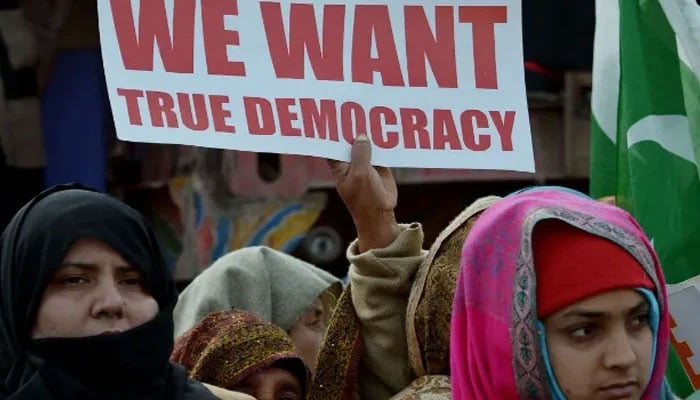Pakistan’s democracy remained under significant strain
ISLAMABAD: Pakistan Institute of Legislative Development and Transparency (Pildat) has outlined critical challenges to democratic health of Pakistan in 2024.
In a report, Pildat observed as democracy around the world faced crises, Pakistan’s democracy also remained under significant strain, and is facing persistent systemic issues.
The Pildat’s report “Quality of Democracy in Pakistan 2024” said in Pakistan democracy has seldom got a breather in the past decade and year 2024 has been no exception. “Except that if at all it was possible, democracy has been pummelled further”.
By an all too familiar scenario, another alliance of politicians with the establishment came about, either under extraordinary pressure to address most serious economic crisis of its history or because of the politicians’ eagerness for crumbs of power, the report stated.
“This was achieved through a constitutional, legal and administrative onslaught by holding of a managed election, curbing powers of judiciary, muzzling of parliament, continuing increase in incarceration of opposition and thwarting and rolling back rights of citizens - all to further centralise decision-making”, the report observed.
The Pildat’s report highlighted following key issues which impacted democracy in Pakistan in 2024. It noted 12th general election held in February 2024 was a largely flawed exercise served to fracture popular mandate and to provide citizens only with a modicum of political and electoral choice. “Apparently, to safeguard its razor-thin majority in parliament, federal government embarked on a mission to restructure higher judiciary”.
The 26th Amendment to Constitution effectively changed appointment process for leadership in higher judiciary and bifurcated judiciary in two branches dealing with constitutional and other matters. Due to the resistance offered by JUIP, sharp edge of proposed amendment was blunted to some extent, the report stated.
As per report, the parliament also hurriedly passed amendments to the acts governing three defence services to extend service tenures of respective services chiefs from existing three to five years. “This is the first time in history of country such a term increase has been legally introduced without a Martial Law in place and during peace time”, the report observed.
Pakistan’s leading political parties have continued to display a sad and familiar proclivity to assist the establishment against a political opponent in return for short-term selfish political gains, the report viewed.
“Such a regular political pattern has found parties reaping politico-electoral benefits at a steep cost of weakening of democracy and democratic governance in Pakistan.The current political set-up emerged through 12th general elections is no different”.
-
 Fukushima Decommissioning: Japan Deploys Snake-like Robot To Remove Nuclear Debris
Fukushima Decommissioning: Japan Deploys Snake-like Robot To Remove Nuclear Debris -
 Brenda Song Turns Macaulay Culkin's 'Home Alone' Into 'terrible' Lesson: 'Children Have To Be A Little Scared'
Brenda Song Turns Macaulay Culkin's 'Home Alone' Into 'terrible' Lesson: 'Children Have To Be A Little Scared' -
 MrBeast Vows To Book Only Starlink-equipped Flights As Global Airline Adoption Surges
MrBeast Vows To Book Only Starlink-equipped Flights As Global Airline Adoption Surges -
 Kim Jong Un Says North Korea Ready To ‘get Along’ With US But Sets Key Condition
Kim Jong Un Says North Korea Ready To ‘get Along’ With US But Sets Key Condition -
 Andrew Fears What Comes Next As Jeffrey Epstein Scandal Deepens
Andrew Fears What Comes Next As Jeffrey Epstein Scandal Deepens -
 Inside Meghan Markle's 'scary' Postpartum Preeclampsia Journey
Inside Meghan Markle's 'scary' Postpartum Preeclampsia Journey -
 'Sinners' Creator Ryan Coogler's Bombshell Statement Comes To Light After Oscar Nomination
'Sinners' Creator Ryan Coogler's Bombshell Statement Comes To Light After Oscar Nomination -
 Teddi Mellencamp Pens Sweet Message As Daughter Dove Turns 6: 'Love You So Much'
Teddi Mellencamp Pens Sweet Message As Daughter Dove Turns 6: 'Love You So Much' -
 James Hetfield's Health Struggle Amid His 2026 Las Vegas Sphere Residency
James Hetfield's Health Struggle Amid His 2026 Las Vegas Sphere Residency -
 Princess Beatrice, Eugenie Are Now Facing The Same Wait As Their Parents: ‘Their Future Has To Be Decided’
Princess Beatrice, Eugenie Are Now Facing The Same Wait As Their Parents: ‘Their Future Has To Be Decided’ -
 Trump’s Tariff Turmoil Yet To Significantly Dent Growth In Emerging Economies, Despite Raising Trade Tensions
Trump’s Tariff Turmoil Yet To Significantly Dent Growth In Emerging Economies, Despite Raising Trade Tensions -
 Will There Be 'Smiling Friends' Season 4? Animated Series' Creators Make Big Announcement
Will There Be 'Smiling Friends' Season 4? Animated Series' Creators Make Big Announcement -
 Jennifer Aniston, Boyfriend Jim Curtis Prepare To Move In After 'hard Launching' Their Relationship?
Jennifer Aniston, Boyfriend Jim Curtis Prepare To Move In After 'hard Launching' Their Relationship? -
 Lamar Odom Details Struggle With Addiction And ‘amazing’ Rehab Experience
Lamar Odom Details Struggle With Addiction And ‘amazing’ Rehab Experience -
 Nvidia Vs Intel: Jensen Huang Braces Investors For Renewed Battle As Chip Wars Reignite
Nvidia Vs Intel: Jensen Huang Braces Investors For Renewed Battle As Chip Wars Reignite -
 Heidi Montag Reveals Why She Felt 'robbed' On 'The Masked Singer' After Her Elimination
Heidi Montag Reveals Why She Felt 'robbed' On 'The Masked Singer' After Her Elimination




